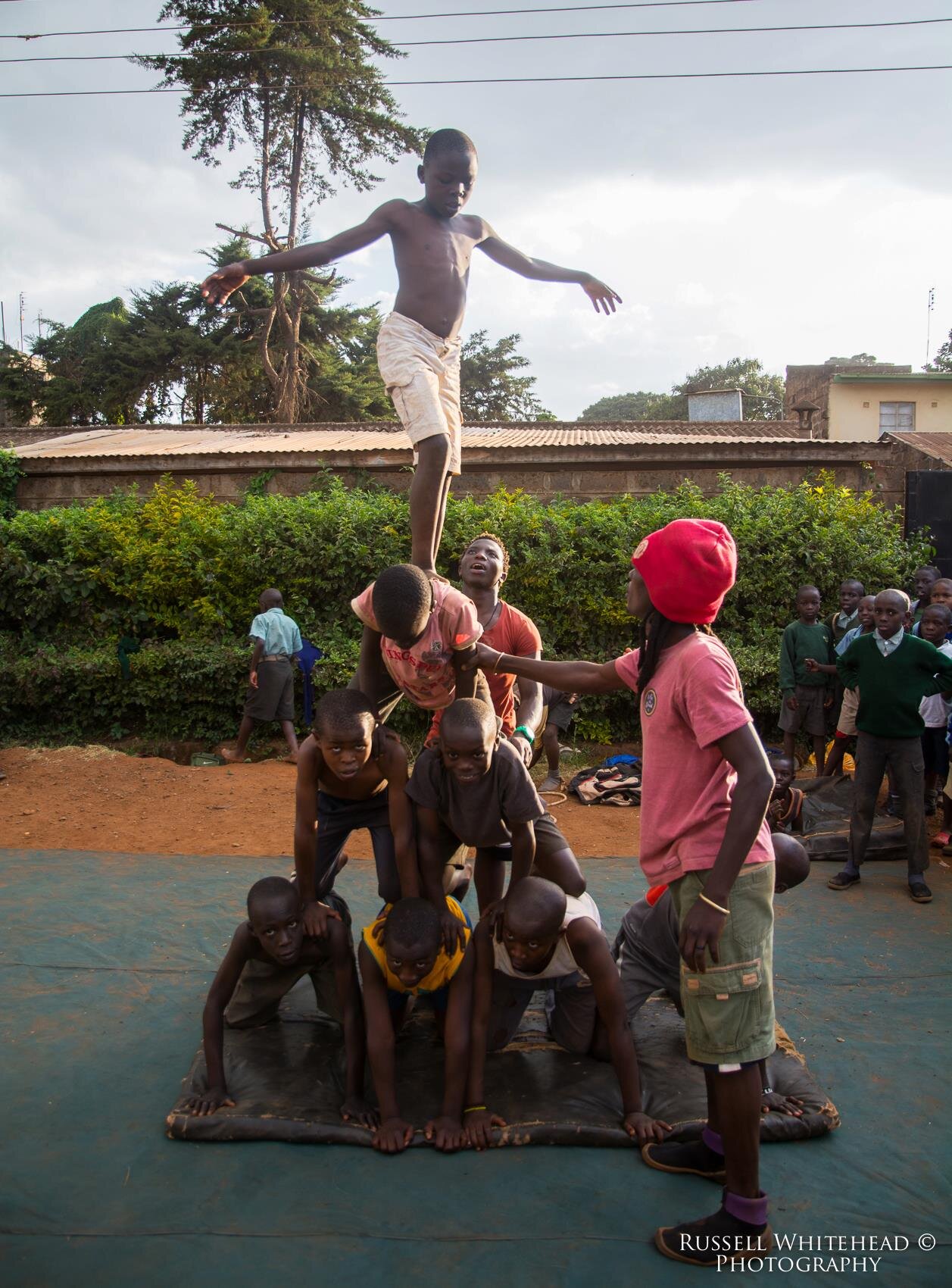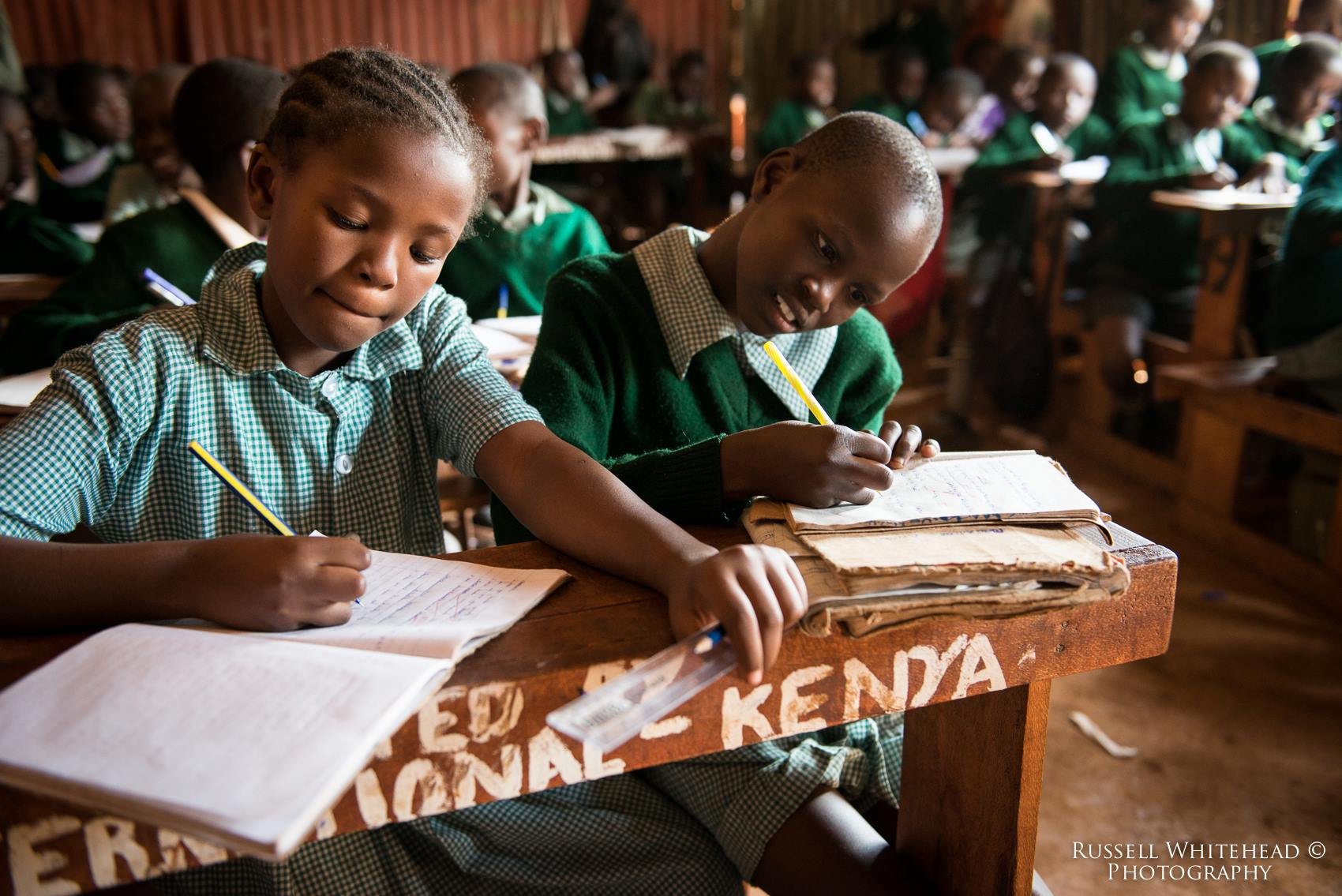Kibera
I travelled to Kenya into Kibera, one of the world’s largest slums, to document the success stories that the charity has facilitated. On assignment I provided Global Care, a children’s charity, with promotional material for gaining sponsorship for destitute orphaned children.
For a week I stayed at the school, which provides safety and a rare chance of an education and future. It was a privilege to get to know these optimistic children and heroic teachers who give hope where there is little usually to have.
Kibera, Kenya (2013)
Peering through the small window of the plane, the eminent yellow sun is low as I arrive in Jomo Kenyatta, Nairobi airport. As this is my first time flying alone, I couldn’t sleep, with either excitement or sitting for nine hours. I’m a tall guy, not great for sleeping in seats. Apparently, the airport has a bad reputation, for corruption and bribery though fortunately, Billy, a friend of the head-teacher is waiting for me. He is a small man who always wears baggy shirts two sizes larger than needed. He is standing with a name board with a big smile. Billy is my driver for the week.
There is a distinct muggy dry heat with the red, orange dust that seems infused everywhere from roadsides to people. Billy and I exchange polite conversation as much as can be interpreted with our localised accents. My reason for being here is to create media for Global Care, a charity that supports children in extreme poverty, in order for them to be sponsored for a better quality of life.
I’m meeting Kenyanito the school leader in a cafe, which would sit well with the likes of the familiar coffee franchises in the UK. I had a lemon; ginger and honey drink for a cold I developed on the plane, great timing! Seems silly to have a cold in this heat.
The drink is served in a large mug with thick natural honey on the side. The small shopping complex was like any other; apart from security everywhere casually cradling AK47′s as protection. In a way, I feel safer knowing they were there, even though I wouldn’t be in the same situation shopping in England. Kenyanito is a towering man with a determined yet kind manner, who welcomes me with humour, though is immersed in determination when discussing the plight of his work. He sometimes quotes Nelsen Mandela, “Education is the key to success, the key to life.” Kenyanito is a school leader, a priest and member of numerous boards, too many to recall. “We build their self-esteem, and we build their capacities for life.” Kenyanito states. He’s a tall, busy positive man, neatly dressed often in bright shirts and is equally charismatic with his words. He is a successful result of a sponsored child, from abject poverty to community leader. Now and then he stumbles his words, coughs, apologies a few times with a difficult throat. “Sorry, I have a cold” he says.
The primary to secondary school, Spurgeons Academy, is in the heart of the Kibera slum, with endless seams of shanty constructions made from metal sheets fastened with numerous threads. As we drive through, the scenes are what I expected, with my only reference being from news or films. There is a voice repeating in my head, “I’m actually here”. I ask Kenyanito for some polite Swahili words to use. “Jambo” means hello, “Habari” means how are you? “Asanti” means thank you. I try and remember the words using some English association; I’ll just have to remember them.
The school first appears like any other, yet much smaller, though consists of several classroom size buildings with windows scattered along. A closer inspection reveals only sufficient construction with broken beams, holes in walls, no glass in windows, crumbling steps and the almost suffocating sand affiliated to everything including my trousers and shoes, camera and shirt. The urinal is a ditch by the building that attempts to stream out of the fence though often ventures into the playground. The other toilets are further away consisting of a sheltered hole in the ground, which you can smell potently from a distance with any slight breeze. I’m not sure where the waste leads. There is a well in the playground that is sealed off as Kenyanito explains they don’t need it anymore as they now have a water pipe. I cannot help think that a British school would never be allowed to open with deep severe steps, broken fences, numerous dangers on every corner. In contrast, the children are constantly upbeat as they burst out the classrooms, a smile on every face, especially seeing me, a new face in their midst. The children gather around in a pool of wondered faces peering up to me with fascination. “Jambo, Jambo”, they repeat with the constant greeting of “high five” with a clasp on hands, which I humbly repeat until the teachers tell them to give me space. The children all wear green jumpers with either a green tartan dress or black trousers respectively. Incredibly they manage to keep them relatively clean despite such a forbidding environment. Again on closer inspection most of the uniforms are tattered with holes and fading materials, though nothing seems to dampen their spirits or enthusiasm. At school they are provided with regular meals and have a great ordered self-hygiene even though it’s through a tap, which may have its own issues. The food is the same everyday which is dried corn and overcooked beans; neither have taste though they relish every bite. I am asked to eat with them, which I humbly accept, though cannot help think how tasteless, hard and almost inedible it is.
I perch in the corner taking video and pictures as the class stare inspiringly at the teacher who discusses disease awareness and prevention. They learn the national curriculum as any other school in Kenya, giving them a nationally recognised qualification when they graduate. Of course, the school where all these children are sponsored provides much more than education. The provisions of food, cleaner water, and a hope for a future, which they clearly appreciate with every moment. With so many children without this opportunity in Kibera, Kenyanito says “Every student is very lucky to be here”. I guess they know it.
The waste of the slum surrounds the perimeter like a chokehold, a waste fence. Kibera is made of small homes made from sheets of disused metal and stretches on for miles in winding dry muddy paths of litter and waste. In monsoon season the wet mud causes greater concern with disease. Kibera is said to dwell one million people, one of the most densely populated areas in the world, which is also one of the largest slums. Rainbow, my guide or should say bodyguard, sometimes holds my hand as we walk through repeatedly notorious areas of Kibera. Rainbow, who always wears a grey stout hat, may be small in stature, though I soon realise he’s the man about. He seems to know everyone. We walk for miles of mud walkways, mud fastened make shift homes with people in ragged clothes. I attempt to hide my feelings of persistent insecurity with other feelings of humble fascination. Collins carry’s my rucksack with camera inside as it is too dangerous for me to be seen with it. He is a teacher at the school. As a photographer I have desires to capture everything, especially things many people don’t see. Unfortunately, this time caution persists over curiosity. Halfway through is an abandoned rail line with unidentifiable abandoned buildings and discarded machines. Mostly I seem to be unnoticed. Maybe they are used to foreign charity workers coming through, or maybe no outsiders at all, as no one on the outside would want to go in. Everyone seems busy on their market stalls or getting on with their day.
Mary, one of the sponsored pupils, lives in a very small room, about the same
size as my bedroom as a child, with a chair and a bed where she, and her mum reside. I am given my bag so I can film. Rainbow suggests I don’t waste any time and keep the filming short not to promote my presence. We quickly move on passing hundreds of other homes as tight as beach huts with people
selling whatever they can. There is an array of shoes, and often charcoal like substance in small buckets, which is for fuel. Before I came here, people would say how they wouldn’t be able to deal with the scenes of poverty, especially with children. I wondered this myself, though it could well be that I’m hiding these feelings behind my camera, acting professional, or is it that I’m overwhelmed into a state of despondency, I’m unsure.
In the evening I’m taken back to my guesthouse just outside of Kibera. The guesthouse is guarded like most places with armed guards wearing uniform. The reception is very British regal with pillars and receptionists wearing bright red uniforms. I’m told it’s unsafe for me to wander or be out in the evening. Apparently at night-time the area is a different, dangerous place. Once I went by the pool, which was quite luxurious and had a few people swimming. There always seemed to be vultures or hawks circling overhead, around and around. I felt anxious, uncomfortable and I didn’t bring swimwear anyway. So I spent most of the evenings by my computer trying to stay in touch with the worried ones at home with intermittent Wi-Fi. I checked my footage, yet didn’t work on it too much.
Interviewing the children the next day at Spurgeons Academy was troubled by nearby construction work of new classrooms funded by the charity. I had no alternative but to put the camera and microphone much closer to them which I thought might hinder their natural response. Mary, a pleasant smiley ten year old whose home I visited previously, is a soft faced small girl, living with her widowed mother who has HIV and is struggling. Her father died during the troubled Kenyan elections in 2008. “When the election happened, he went to Mombasa and he’s never come back.” She speaks quite objectively, with elegance as she goes on to tell of her elder brother who also died three years ago, and now Mary and her mother are alone. “When my brother reached class seven, he became sick then died.” They sometimes live in a small shack made of corrugated iron sheets, but frequently get evicted because of rent arrears and have to live with anyone who will take them in. She often nurses her mother and does what she can to support a better lifestyle. As she speaks, her mature life experience is strong and confident though I can see this begins to trouble her, so I ask her questions about school and what is fun, does she like singing? Immediately a wonderful full faced smile shines through, she is a child again as she talks about how much she enjoys dancing and arts. When I ask the children about their future aspirations they seem determined to be supportive to their community. Everything to improve where they are by being doctors, businessmen and teachers. “What I want to do when I grow up is to be a nurse, to help people like my mother.” None of them say they want to leave or be an astronaut or pop star. The interviews continue as it becomes obvious that they are orphans, either through the parents going by choice or disease. Either way they speak quite coherently in English and almost objectively about life in Kibera. Is it that the camera is making them hide their emotions or is it a routine part of life here.
My cold seems to be departing, which seems apt in this forty plus heat, which is sometimes stifling. Yet again in the evenings I eat at the guesthouse then remain alone, dwelling on new thoughts and the sights of the day. The sight of children playing in waste, homes made like an unacceptable English garden shed, disease spreading as if intergraded with the gritty red mist that they all breathe. Everyone has red bloodshot eyes. From the teachers to the children. I am well aware that the western way of life is self-indulged. Though a different way of life does not mean a worse one in every respect. I find great strength, spirit and pride in the people I have met here. The children often remain behind after school, as it’s a safe place to be. There athleticism is incredible as they play with the skipping rope with jumps I’ve only dreamed about as a child.
We drive around the perimeter of the slum, which really shows the extensiveness of Kibera. I notice that Billy and the others use phones, which about 10-15 years ago most people in England were using. Same for the cars or anything for that matter. We stop repeatedly to film the best views. If I look one way I see a horizon of shanty homes with snake like paths of mud and squalor. Children playing covered in rags and dust. If I turn directly behind, there is an esteemed professional golf course with large spaces of trimmed bright green grass.
On the last day I travelled into Nairobi. I was immediately ambushed with beggars, sellers and crowding just as any visitor to the city. “You are an obvious target” Billy said. Thankfully I had him with me, who guided me through some tourist spots which were mainly British representations of settlement. Like that of Big Ben, Parliament, train stations, tall buildings etc. We went to the top of one of the city’s tallest building’s, The Kenyatta International Conference Centre, which has a helipad. The guide tells us about how the city started and developed due to British involvement. He doesn’t say if it’s a good thing or not. Compared to taller buildings I’ve ventured, including the Eiffel Tower, this isn’t very high, though Billy seems astonished by the scene. He constantly looks puzzled pensively putting his hand to his mouth trying to figure things out, where he comes from. For me, the city looked like most others and felt too hectic.
Everything in England is vividly green. I can taste the moisture, condensation, rain pattering on windows; everything looks new. After relaxing back into my home life, I wrote, “Its possibly stereotypical to announce such things, a distant traveller acquires a new wisdom, or a new perspective of life. Though as my mind wanders to images of my journey, my pre-journey personality, of anxieties, insecurities and self absorbed feelings seem to have departed, and the person I was, seems somewhat unrecognisable.” Then I soon come across crying children in supermarkets begging and screaming for toys or sweets, just as I did as a child. People were cleaning their cars with endless amounts of flowing water. I could no longer take selfies or neglect to be grateful for any home comfort. I was aware of injustice even more than I was prior to my journey and endeavoured for an empathetic perspective. I also believe that until you experience a different way of life, at least in some tangible way, I don’t think it can really affect you. I was thinking of ways to educate, either children or adults in sharing my perspective. I felt like I knew something and that everyone should know. I continued, “I seem to be standing taller, I have more… backbone. I feel like I could take on the world and nothing could stop me!”
Of course my photography desires these artistic educational aims and I was successful in my assignment for the charity, though I hope that media desensitisation isn’t too prominent. A few months later there was a terrorist massacre in the Westgate Mall shopping centre I visited in Nairobi. It was absurd seeing the place being violated in such a way. I also know a past university friend whose brother was killed in the incident.The months pass, the perpetual struggle for photography work resumes with my regular part time retail job supporting. With each month, I feel my previous self, seep through the cracks in excesses. I find myself looking back at photos and videos attempting to reassert that confidence and appreciating perspective. When I talk about this career achievement to someone new, they often say “it must have been eye opening, incredible experience.” I agree. Though actually, those feelings and grand realisations have passed back into the labyrinthine routine of everyday.
www..globalcare.org.uk















